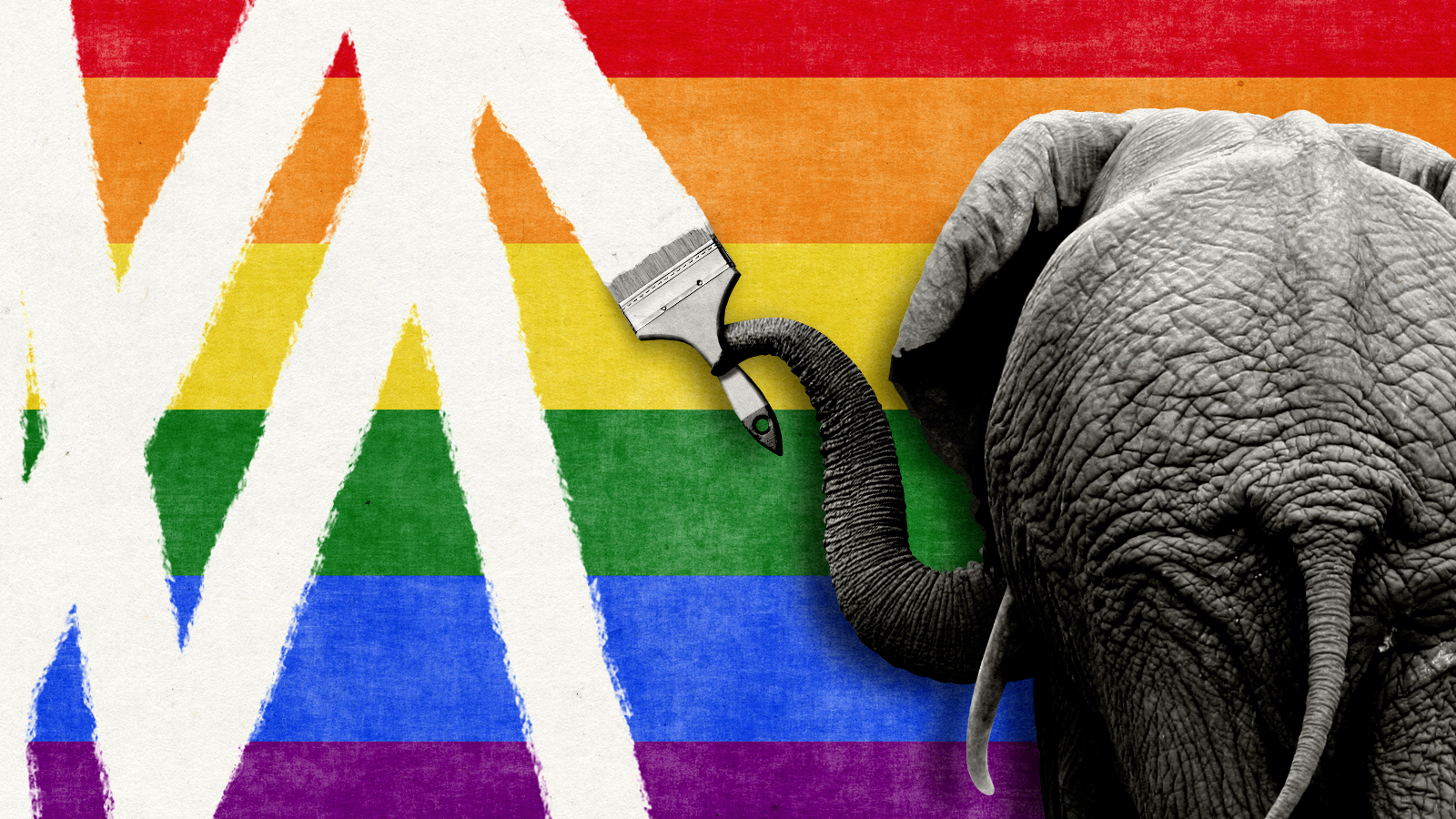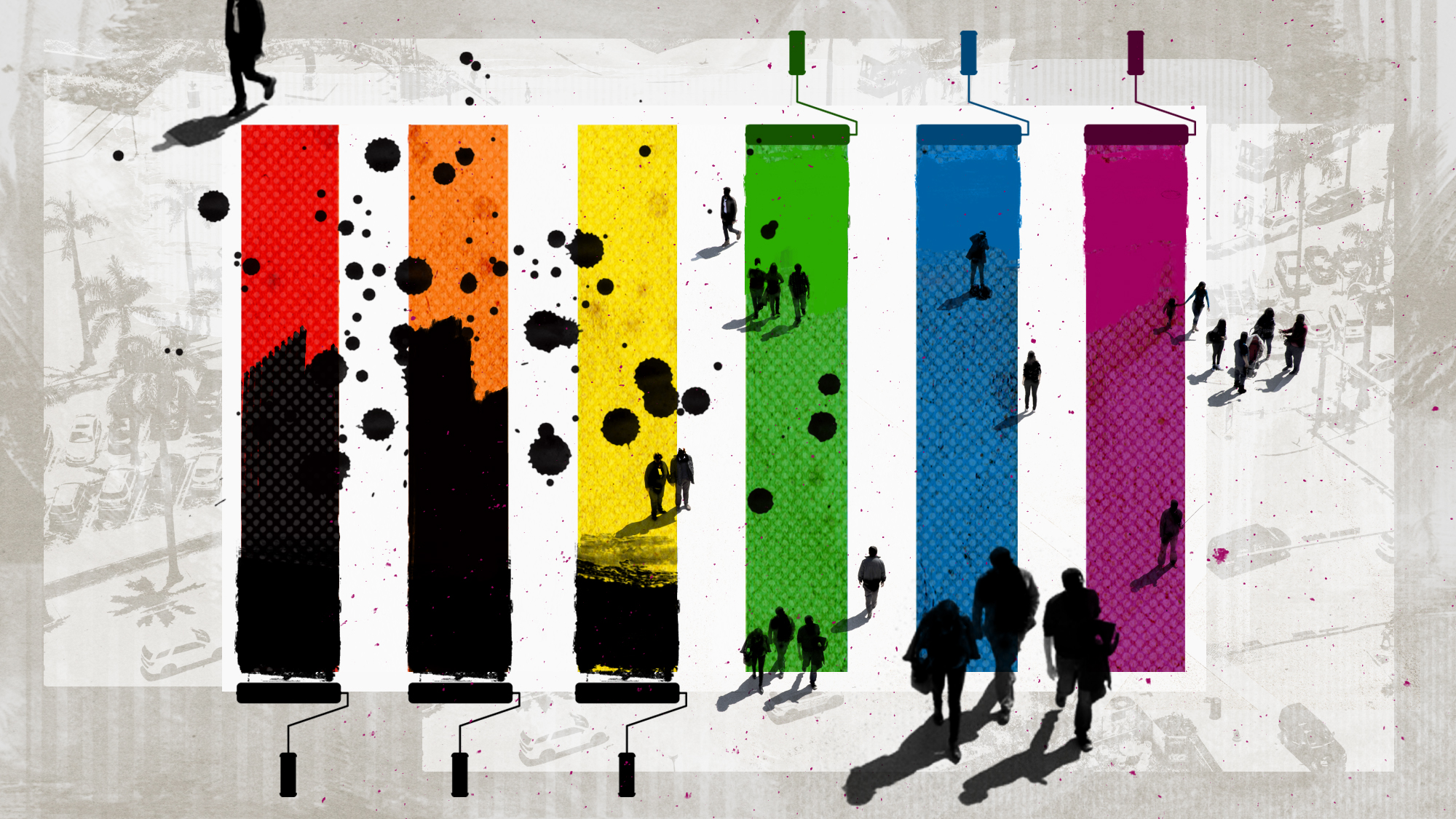The anti-identity politics of gay conservatives
Brandon Straka and the curious case of the LGBTQ right


A free daily email with the biggest news stories of the day – and the best features from TheWeek.com
You are now subscribed
Your newsletter sign-up was successful
On Monday, a U.S. District Judge sentenced Brandon Straka, a conservative influencer and #MAGA social media star, for participating in and encouraging the Jan. 6 insurrection at the U.S. Capitol. His punishment includes three-year probation, three months of house arrest, and a $5,000 fine. Straka is one of the hundreds of people who have faced charges in recent months for their involvement in the Capitol riot. As many other insurrectionists have done, Straka cooperated with prosecutors and admitted to his role in the Jan. 6 event in order to strike a plea deal that resulted in a reduced charge of disorderly conduct.
A gay hairstylist from New York City, Straka doesn't fit the profile most people probably think of when it comes to the rioters who stormed the Capitol. Yet Straka wasn't the only LGBTQ person who participated in the insurrection, a day that saw a handful of Pride flags curiously marching alongside the throng of Confederate flags and "Don't Tread on Me" banners.
Beyond the events of that day, Straka represents a far larger movement of LGBTQ conservatives whose visibility has grown in the last several years. Distinct from the long history of gay Republicans who worked to make the GOP more inclusive and tried to push it in a moderate direction, the contemporary LGBTQ right has instead helped sharpen the Republican Party's extreme edge and perhaps even embolden its anti-LGBTQ agenda.
The Week
Escape your echo chamber. Get the facts behind the news, plus analysis from multiple perspectives.

Sign up for The Week's Free Newsletters
From our morning news briefing to a weekly Good News Newsletter, get the best of The Week delivered directly to your inbox.
From our morning news briefing to a weekly Good News Newsletter, get the best of The Week delivered directly to your inbox.
Straka's rise to fame — or infamy — says a lot about what gets traction in conservative circles these days and how that's shaping the GOP. In 2018, Straka found notoriety when his six-minute video, "Why I Left Liberalism & the Democratic Party," went viral. "Once upon a time, I was a liberal," Straka began before urging other Democrats to #WalkAway, a hashtag that grew popular on Twitter where Straka now has a half-million followers.
The video was, as BuzzFeed's Will Sommer rightly described it at the time, "exactly the kind of conversion narrative primed to go viral on the right," a string of rants against "tyrannical groupthink," "social justice warriors," "the liberal media," and other conservative bugaboos. The "extremist left," Straka argued, had become consumed with a "cult ideology" that sees racism, sexism, and homophobia everywhere. Meanwhile, the "self-proclaimed victims of intolerance" had become the new agents of bigotry — and it was white, heterosexual men who were paying the price for all of it.
Conservative media lapped it up. Thanks to favorable coverage in outlets like Fox News, Breitbart, and The Gateway Pundit, plus a boost from, according to CNN, thousands of Kremlin-connected Russian bots on Twitter, Straka's video and his #WalkAway hashtag exploded. Once President Trump tweeted his approval, Straka's star rose even more, yet another publicity stunt hack made into a conservative celebrity by virtue of Trump's endorsement.
And the stunts continued. Just months into the pandemic, American Airlines removed Straka from a flight for refusing to wear a mask, an altercation Straka promptly publicized on his Twitter account. Other moves seemed designed purposefully to provoke, like releasing his version of Cyndi Lauper's "True Colors" — an anthem often associated with supporting LGBTQ rights — as a tribute to Trump and his supporters. After Manhattan's LGBT Center decided to cancel an event by Straka at its facilities, he fired back with a $20 million discrimination lawsuit. Around the same time, he declared that he wouldn't be celebrating Pride Month that year, because it had become a "sham" and an "anti-Trump rally."
A free daily email with the biggest news stories of the day – and the best features from TheWeek.com
Predictably, conservative media has cheered on all these antics. And Straka and other LGBTQ conservatives have continued to make anti-establishment, anti-identity arguments — such as attacking the strong alliance of most LGBTQ organizations and the Democratic Party that they dismiss as "Gay Inc." — to elevate their profiles in conservative circles. For several years now, one of the most repeated lines from LGBTQ Republicans has been that it is now harder to come out as conservative than as LGBTQ.
That's a laughable notion, of course, but it's just the sort of politics of victimization that animates the right these days. Appearing frequently on conservative media, like Fox News, Straka and other figures of the queer right repeatedly assure their largely white, heterosexual audiences that it is they who are now the most oppressed demographic in American life, not the racial and sexual minorities, including LGBTQ folks, the left presents as "victims."
And that's why Straka and other LGBTQ conservatives have found a place in a party — or at least, its media universe — that for most of recent history targeted LGBTQ Americans for political gain. They are there to facilitate the right's grievance politics all while castigating the left as obsessed with victimhood. Who better to prove you aren't a bigot than a gay man who says you are the biggest victim of bigotry today?
Neil J. Young is a historian and the author of We Gather Together: The Religious Right and the Problem of Interfaith Politics. He writes frequently on American politics, culture, and religion for publications including The New York Times, The Atlantic, the Los Angeles Times, HuffPost, Vox, and Politico. He co-hosts the history podcast Past Present.
-
 The environmental cost of GLP-1s
The environmental cost of GLP-1sThe explainer Producing the drugs is a dirty process
-
 Nuuk becomes ground zero for Greenland’s diplomatic straits
Nuuk becomes ground zero for Greenland’s diplomatic straitsIN THE SPOTLIGHT A flurry of new consular activity in Nuuk shows how important Greenland has become to Europeans’ anxiety about American imperialism
-
 ‘This is something that happens all too often’
‘This is something that happens all too often’Instant Opinion Opinion, comment and editorials of the day
-
 The billionaires’ wealth tax: a catastrophe for California?
The billionaires’ wealth tax: a catastrophe for California?Talking Point Peter Thiel and Larry Page preparing to change state residency
-
 Bari Weiss’ ‘60 Minutes’ scandal is about more than one report
Bari Weiss’ ‘60 Minutes’ scandal is about more than one reportIN THE SPOTLIGHT By blocking an approved segment on a controversial prison holding US deportees in El Salvador, the editor-in-chief of CBS News has become the main story
-
 Has Zohran Mamdani shown the Democrats how to win again?
Has Zohran Mamdani shown the Democrats how to win again?Today’s Big Question New York City mayoral election touted as victory for left-wing populists but moderate centrist wins elsewhere present more complex path for Democratic Party
-
 Millions turn out for anti-Trump ‘No Kings’ rallies
Millions turn out for anti-Trump ‘No Kings’ ralliesSpeed Read An estimated 7 million people participated, 2 million more than at the first ‘No Kings’ protest in June
-
 Florida wages crosswalk war on public displays of pride
Florida wages crosswalk war on public displays of prideIN THE SPOTLIGHT Gov. Ron DeSantis' campaign comes for colorful crosswalks, as Florida residents engage in guerrilla graffiti as a form of resistance
-
 Anti-trans scandal roils major LGBTQ+ literary prize as authors withdraw en masse
Anti-trans scandal roils major LGBTQ+ literary prize as authors withdraw en massein the spotlight Multiple nominees for the UK's premier queer writing award have removed themselves from contention to protest the inclusion of a self-proclaimed 'trans-exclusionary radical feminist' in their ranks
-
 Ghislaine Maxwell: angling for a Trump pardon
Ghislaine Maxwell: angling for a Trump pardonTalking Point Convicted sex trafficker's testimony could shed new light on president's links to Jeffrey Epstein
-
 The last words and final moments of 40 presidents
The last words and final moments of 40 presidentsThe Explainer Some are eloquent quotes worthy of the holders of the highest office in the nation, and others... aren't
